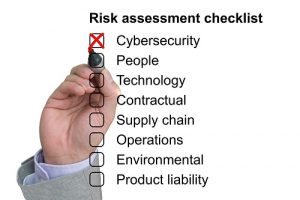Why Small Businesses Must Take Cyber Threats Seriously—And How Integrated Technology Systems Can Help
 In today’s increasingly digital world, businesses of all sizes—especially small and medium-sized enterprises (SMBs)—face a rising tide of cyber threats. According to the World Economic Forum, global cybercrime costs are expected to exceed $10.5 trillion annually by 2025. That staggering figure is more than just a number—it’s a wake-up call.
In today’s increasingly digital world, businesses of all sizes—especially small and medium-sized enterprises (SMBs)—face a rising tide of cyber threats. According to the World Economic Forum, global cybercrime costs are expected to exceed $10.5 trillion annually by 2025. That staggering figure is more than just a number—it’s a wake-up call.
At Integrated Technology Systems, we believe cybersecurity should never be an afterthought. It’s a business essential. Below, we’ll explore why cybersecurity matters, break down its core components, and reveal the top 10 benefits every business should understand.
Why Is Cybersecurity So Important?
Cybersecurity protects your business's most valuable digital assets—customer data, financial records, proprietary information—from malicious attacks. A single breach can result in millions of dollars in damages, lost customer trust, and even regulatory penalties.
IBM’s 2024 Cost of a Data Breach Report revealed that the average cost of a breach is now $4.35 million, a 2.6% increase from the previous year. Clearly, proactive protection is more affordable than reactive recovery.
Core Types of Cybersecurity You Should Know
 1. Network Security
1. Network Security
Safeguards your infrastructure with tools like firewalls and intrusion detection systems to prevent unauthorized access.
2. Endpoint Security
Secures every connected device—laptops, phones, tablets—using antivirus software, EDR (Endpoint Detection and Response), and patch management.
3. Cloud Security
Ensures the safety of data and applications hosted in cloud environments through encryption, access controls, and secure configurations.
4. Application Security
Protects software applications through secure development practices, code audits, and firewalls, defending against app-specific vulnerabilities.
5. Identity & Access Management (IAM)
Controls user access with multi-factor authentication (MFA), role-based access, and single sign-on to prevent unauthorized entry.
6. Data Security
Encrypts and protects sensitive business data against breaches with technologies like data masking and DLP (Data Loss Prevention).
7. Operational Security
Covers policies for disaster recovery, incident response, and business continuity—ensuring you're ready to respond and recover quickly.
8. Mobile Security
Secures smartphones and tablets through mobile device management (MDM) and mobile threat defense tools.
Top 10 Benefits of Cybersecurity
 1. Protection Against Cyber Threats
1. Protection Against Cyber Threats
Cybersecurity tools block malware, ransomware, phishing, and other threats before they can damage your systems or steal your data.
2. Safeguards Sensitive Data
Encryption and access controls ensure personal, financial, and proprietary information stays protected.
3. Ensures Business Continuity
Minimizes downtime during a cyber event so your business operations remain uninterrupted.
4. Boosts Customer Confidence
Customers are more likely to trust and remain loyal to companies that visibly take security seriously.
5. Compliance with Regulations
Meet legal and industry standards (like HIPAA, PCI-DSS, and GDPR) to avoid fines and maintain your professional reputation.
6. Protects Intellectual Property
Secure your innovations, trade secrets, and competitive advantage from prying eyes and corporate espionage.
7. Reduces Financial Losses
Avoid the high cost of breach recovery—including legal, operational, and reputational damage.
8. Enhances Employee Productivity
When systems are secure and reliable, employees can work efficiently without security-related disruptions.
9. Identifies and Mitigates Risks Early
Routine security assessments and threat intelligence help you detect and resolve vulnerabilities before they escalate.
10. Strengthens Your Reputation
A proven security track record builds stakeholder trust, differentiating you from competitors and opening doors to more business opportunities.
Why Small Businesses Are Prime Targets
Cybercriminals love easy targets—and unfortunately, small businesses often fit that description. Limited budgets, outdated systems, and lack of awareness all contribute to increased risk.
Here’s why SMBs are especially vulnerable:
- Limited Resources: Few funds for dedicated IT or advanced security tools.
- Lack of Cyber Awareness: Employees may not recognize phishing or risky behavior.
- Outdated Systems: Legacy software often lacks modern security patches.
- Third-Party Risks: Partners and vendors can introduce vulnerabilities if not properly vetted.
How Integrated Technology Systems Can Help
At Integrated Technology Systems, we deliver enterprise-grade cybersecurity to businesses of all sizes. From installing firewalls and VPNs to setting up secure access protocols and monitoring threats in real time, we customize every solution to fit your budget and business needs.
Protect Your Business Before It’s Too Late
Cyber threats don’t discriminate—and waiting until after an attack is too risky. Whether you’re a startup or a growing enterprise, Integrated Technology Systems is here to help you take control of your cybersecurity. Contact us today to schedule a free consultation or learn more about our managed cybersecurity services.
Integrated Technology Systems
6 East 45th Street, Suite 400
New York, NY 10017
212-750-5420
https://www.itsnyc.com



